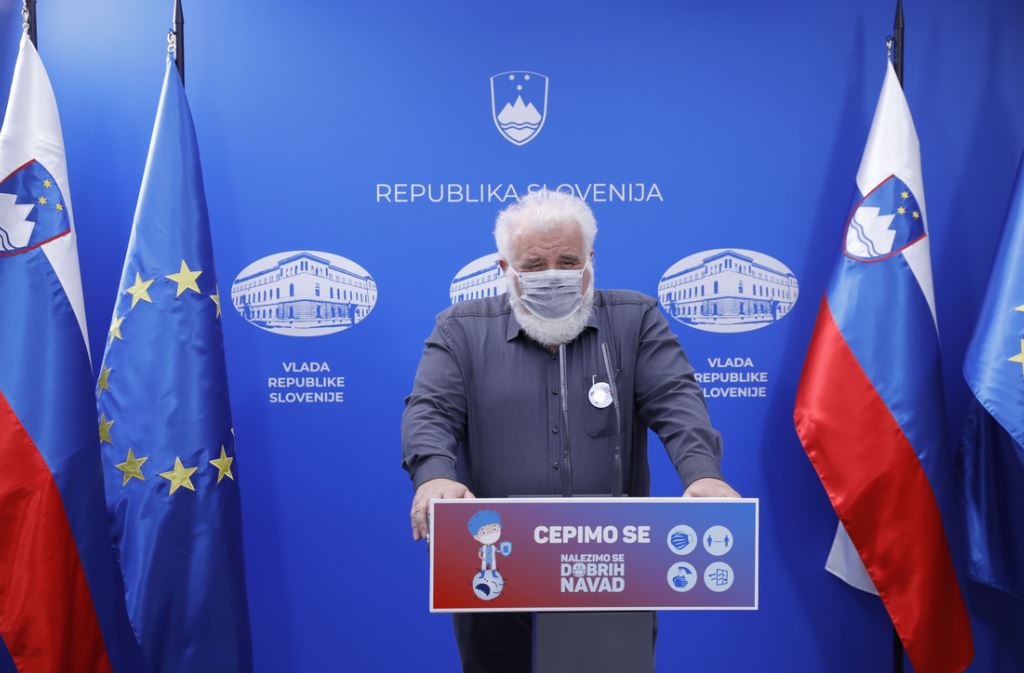At the press conference the Director of the National Institute of Public Health, Milan Krek, and Deana Potza from the Health Inspectorate provided the latest information on the COVID-19 situation in Slovenia.
Milan Krek began by presenting the epidemiological data in individual EU Member States, where, with a few exceptions, the two-week number of new infections per 100,000 people has been on the rise. “Vaccination is the measure protecting the population from the infection, protecting the population from severe cases as well as from death,” emphasised the Director. There have been 239 deaths since 26 June. He also called on every person over the age of 55 to get vaccinated as soon as possible.
He went on to present the current epidemiological data. On vaccination coverage, he said that 56% of the population has received at least one dose of the vaccine, while 52% has also received the second dose.
According to Krek, the National Institute of Public Health has updated its website, making more information accessible than before. He stressed the importance of measures such as vaccination, contact tracing, the call centre, the implementation of different epidemiological measures, complying with the recovered/vaccinated/tested rule, staying at home if presenting symptoms, complying with the isolation and quarantine measures, and always thinking of others. That way you can help reduce the risk. “It’s time to think of others, as well,” concluded Mr Krek.
Deana Potza began by presenting the information on compliance with the recovered/vaccinated/tested rule as the main measure for containing the spread of COVID-19. She explained that the system is designed to keep businesses open. It is in no way about discrimination against one group of citizens or another. The Health Inspectorate, therefore, joins the calls for compliance with this rule.
The inspectorate report on inspections carried out covered the three-week period between 27 September and 17 October. She presented some examples of good practice by individual inspectorates. The Inspectorate for Education and Sport found nine violations of the recovered/vaccinated/tested rule in the sports field, more precisely in fitness centres. Offenders were directed to leave the fitness centre and received warnings. The follow-up inspections revealed that the recovered/vaccinated/tested rule is being implemented in a consistent manner. The warnings were sufficient, and no further sanctions were required. In its report, the Market Inspectorate highlighted the shops, where the compliance with the recovered/vaccinated/tested rule is being consistently checked at the point of entry.
She further explained that, with regard to the implementation of testing, the Health Inspectorate had been informed of a number of individuals who, despite a positive rapid test result, had subsequently failed to undergo PCR testing. Article 32 of the Communicable Diseases Act also provides the basis for imposing sanctions on individuals who, after being informed of a positive rapid antigen test result, subsequently fail to make an appointment for a PCR test.
As regards compliance with the recovered/vaccinated/tested rule, the inspection authorities carried out inspections in 6,325 facilities and on 16,306 persons over a three-week period. The total number of inspections verifying the containment of the spread of COVID-19 was 8,181. 73 minor offence sanctions, 432 warnings under the Minor Offences Act, 14 administrative decisions, and 352 administrative measures were imposed.
In conclusion, Deana Potza announced that stricter inspections will be carried out in the regions with a poorer epidemiological situation.
Ukom


